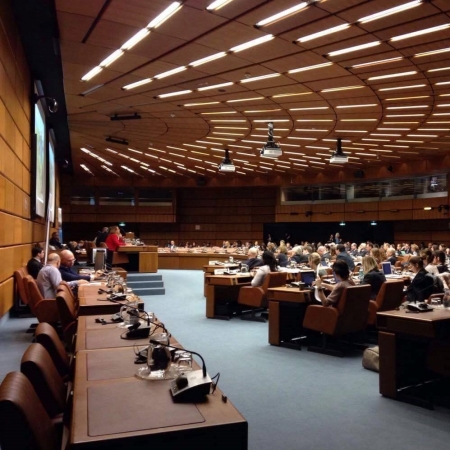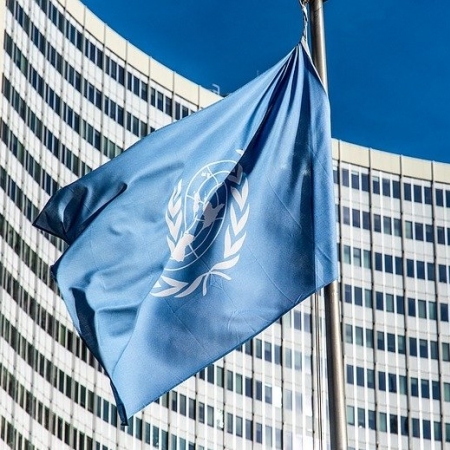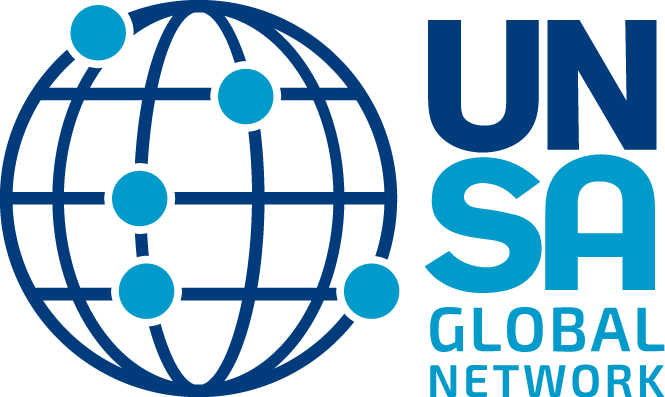
About UNSA
As part of the UNSA Global Network, UNSA Vienna aims at setting new benchmarks with regard to the identification of as well as work on topics and ideas that are critical for the future of the UN system and the implementation of the Sustainable Development Goals (SDGs).
UNSA Vienna aims at promoting the implementation of the SDGs by furthering the work on most commonly overlooked yet important topics and establishing innovative, integrative and solution-oriented approaches to those topics within the UN framework.
News
Activities
: Call for Applications: Social Media Coordinator
For our external communication coordination we are looking for a SOCIAL MEDIA COORDINATOR.
: "When the Climate Crisis claims your Home" - Vernetzung

Zum Auftakt unseres Kunstwettbewerbs am Langen Tag der Flucht am 02. Oktober 2020 werden wir mit einer Performance Action selbst aktiv. / To kick off our art competition on the Long Day of Flight on 2 October 2020, we will get active ourselves with a Performance Action.
: Femicide Video Series
Since the rate of violence against women has increased during the COVID19-crisis, we think it is appropriate to raise even more awareness on Femicide and therefore have decided to turn June into our "End Femicide" month. As part of our Femicide Volume XIII Publication we have received several videos from experts and activists defining Femicide and stating why data collection is important. This video series can now be watched on our brand new YouTube Channel!
Blog
Preface
The Latin American region has one of the highest rates of femicide in the world. Twelve women and girls in the region are killed every day because of their gender. Every two hours, a woman dies in Latin America for the simple fact of being a woman. It is considered one of the most dangerous places in the world for a female (Economic Commission for Latin America and the Caribbean, 2018). Despite the high prevalence of femicide in Latin America, most countries have no comprehensive mechanism to effectively collect data on femicide. This chapter examines the challenges of collecting data on femicide in Latin America and recommends the establishment of a regional surveillance or a monitoring system, in the form of a Femicide Observatory, to collect uniform and consistent statistics throughout the region. The Latin American countries comprise those countries in which Romance languages are spoken by the majority of the population. The countries include (in Central and South America) Argentina, Belize, Bolivia, Brazil, Chile, Colombia, Costa Rica, Ecuador, El Salvador, Guatemala, Honduras, Mexico, Nicaragua, Panama, Paraguay, Peru, Uruguay, and Venezuela. Latin American countries also include Cuba, Dominican Republic, and Puerto Rico.
Preface
“We talk about how many women were raped last year, not about how many men raped women. We talk about how many girls in a school district were harassed last year, not about how many boys harassed girls…” - Jackson Katz (2013)
Femicide (i.e., gender-based murder of women) stands on an equal footing with all types of crime in not discriminating between countries. The only difference is that in some countries, it is more prevalent in comparison with others (see, generally, Strengthening understanding…, 2008). Canada and India are no exception, but the difference is that femicide is less common in Canada than in India. However, regardless of its incident rate, femicide is an unacceptable social reality that needs urgent attention from all the stakeholders. In this article, we will use Canada and India as ‘case studies’ to discuss some of the challenges in trying to collect reliable and valid data on femicide as well as identify some recommendations that can/ might help reduce the ‘dark figure’ of the actual number of femicide cases and how to improve the reliability of data collection of femicide. Because, without reliable and valid data, one cannot adequately inform prevention and intervention practices or policies to combat femicide.
Preface
On April 18-19, 2020, in Nova Scotia, Canada, a lone male, armed with multiple guns, went on a rampage, sparked in part by misogyny, killing at least 13 women and 9 men across multiple rural communities. The result was one of the deadliest mass killings in Canada’s recent memory. Although details have been painstakingly slow to be released, it is clear that at least some of these killings are femicide. Yet police releases, media reports and public discussions that followed the killings have so far not referred to this fact. This situation underscores what many of us know: every country, including Canada, needs a femicide watch or observatory to highlight the sexual aspects of violence experienced by women and girls as well as the sex/gender motivations and indicators frequently at play when women and girls are killed by men, locally and globally. Official narratives surrounding the killings of women and girls – whether a single female victim, multiple female victims, or a combination of female and male victims – often obscures that these are often, and typically, femicides. Simply put, the women and girls were killed because they were women and girls. Therefore, the lives of women and girls continue to be put at risk because the sex-based or gendered elements involved in their killings are often ignored or, if known, are not acknowledged. As a result, the necessary data to develop effective prevention initiatives are not collected or, if available, are not accessible to those actively working to prevent violence against women and girls. Femicide watches or observatories can contribute significantly to addressing these gaps, but only if there is a greater social understanding of femicide as well as the political will and commitment to develop appropriate prevention initiatives. Femicide watches/observatories can work at ensuring this occurs globally.
Take Action
Benefits
for UN Academics:
- visibility, publicity and audience
- networks and platforms
- access to all UNSA target groups
- exchange and interaction
- usage of own work
- inspiration and exposure to new ideas and perspectives
Requirements
for UN Academics:
- open mindedness
- sense of innovation
- solution-orientation
- practical orientation
- openness to dialogue
- interdisciplinarity
- comprehensible use and delivery of knowledge
Ways of Participation
for UN Academics:
- published / journalistic content
- participation and collaboration in events
- mentoring programs
- advice and recommendations
Benefits
for UN Practitioners:
- new communication tools
- access to all UNSA target groups
- exchange and interaction
- channel for access to the latest research findings
- new Ideas and Innovations
- channel for broad and comprehensible communication of UN contents
Requirements
for UN Practitioners:
- open mindedness
- sense of innovation
- solution-orientation
- practical orientation
- openness to dialogue / promoting dialogue
- inclusion / involvement
- transparency
Ways of Participation
for UN Practitioners:
- published / journalistic content
- participation and collaboration in events
- inside knowledge
- mentoring programs
- advice and recommendations
- provision of various facilities
- access to internal UN platforms
Benefits
for Diplomats:
- inspiration and exposure to new ideas and perspectives
- new solutions and approaches
- identification of best practice
- exchange & interaction
- visibility, publicity and audience
- access to all UNSA target groups
- networks and platforms
Requirements
for Diplomats:
- open mindedness
- cooperativeness
- commitment to lead or provide guidance in specific subject area
Ways of Participation
for Diplomats:
- financial Support
- provision of event facilities
- insider knowledge
- transfer of national information
- advice and recommendations
- contact and to UN Practitioners, national civil society, academics, universities, …
Benefits
for Civil Society:
- visibility, publicity and audience
- networks and platforms
- access to all UNSA target groups
- exchange, interaction and support
- inspiration and exposure to new ideas and perspectives
- new solutions and approaches
- identification of best practice
Requirements
for Civil Society:
- profound activism
- openness to dialogue
- open mindedness
- sense of innovation
- solution-orientation
- practical orientation
- analytic skills
Ways of Participation
for Civil Society:
- published / journalistic content
- participation and collaboration in events
- mentoring programs
- advice and recommendations
- practical knowledge
- insight into practical work of the civil society
- establishing contact own network
Benefits
for the Next Generation:
- opportunity to gain professional experience and insight into practical work
- access to all UNSA target groups
- channel for access to the latest research findings
- new Ideas and innovations
- UNSA Community – internal and external exchange
Requirements
for the Next Generation:
- open mindedness
- sense of innovation
- solution-orientation
- practical orientation
- analytic skills
- future-oriented thinking
- commitment and reliability
Ways of Participation
for the Next Generation:
- voluntary work in diverse working areas
- offering new perspectives
- development of new approaches, strategies and digital thinking
Benefits
for Universities:
- inspiration and exposure to new ideas and perspectives
- visibility, publicity and audience
- networks and platforms
- access to all UNSA target groups
- benefit for academics and students
Requirements
for Universities:
- open mindedness
- sense of innovation
- solution-orientation
- practical orientation
- openness to dialogue / promoting dialogue
Ways of Participation
for Universities:
- financial support
- provision of event facilities
- contact to students and academics










